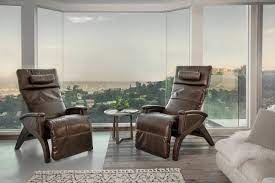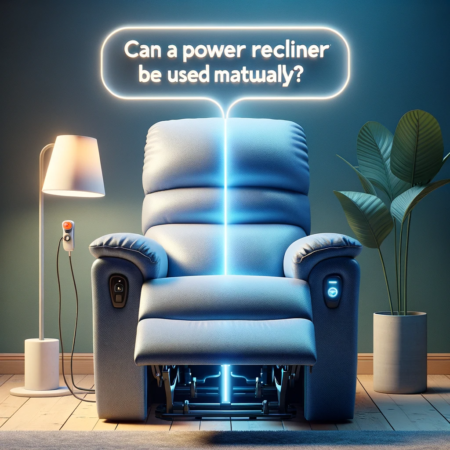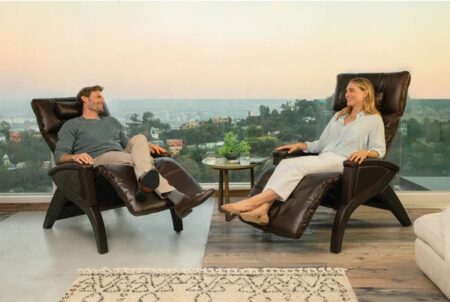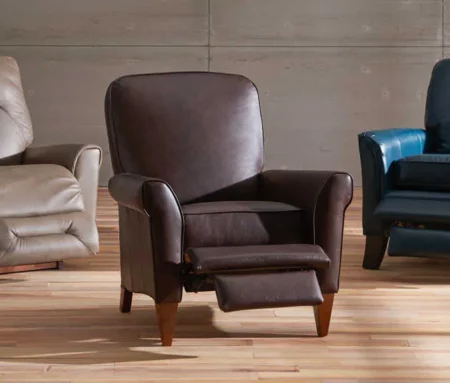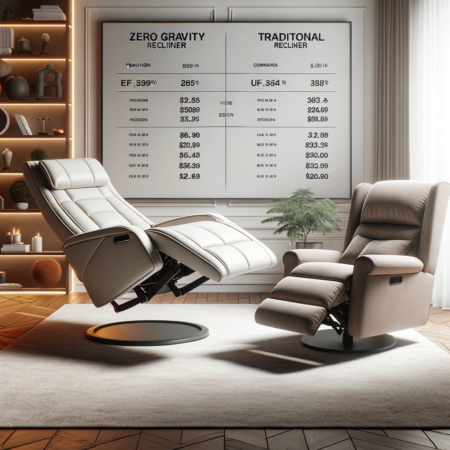A restful night’s sleep is the unsung hero behind our day-to-day productivity and well-being in today’s bustling world. You’ve likely nestled into the familiar embrace of a bed each night, but have you ever considered the cradling contours of a recliner as a serious contender for sleep?
As you wrestle with the curiosity of ‘bed versus recliner,’ you’re not alone. Many are exploring this debate, seeking the ultimate sanctuary for both comfort and health. So, let’s dive in and find out which option is best for you!
Anatomy of Sleep
Sleep isn’t just a passive state of unconsciousness; it’s an intricate physiological process that plays a pivotal role in our overall health and well-being.
The Science of Sleep: Stages and Cycles
Human sleep is composed of several stages that cycle throughout the night. These stages are broadly categorized into two types: REM (Rapid Eye Movement) and non-REM sleep.
- Non-REM Sleep: It has 3 stages further shown in the picture.
- REM Sleep
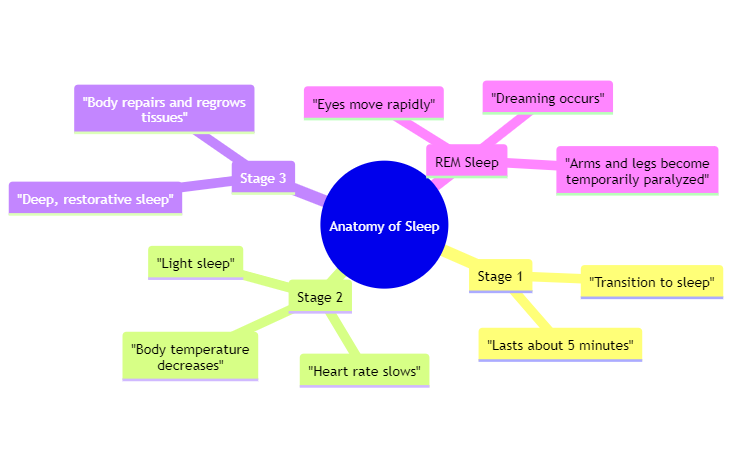
The Case for Recliners
1: Health Benefits
Elevation Aids Medical Conditions
Recliners allow for an elevated sleeping position. This inclination can be particularly beneficial for those who suffer from edema or swelling in the lower limbs, as it promotes the drainage of fluids away from the legs.
People with sleep apnea, GERD, or back pain may find that they get a better night’s sleep in a recliner. The elevated position can help to reduce snoring and apnea episodes, keep stomach acid down, and reduce pressure on the spine.
Respiratory and Acid Reflux Relief
The inclined position of a recliner can be a boon for individuals with respiratory issues, as it can reduce the risk of airway obstructions and alleviate symptoms of conditions like sleep apnea or asthma.
Improved Circulation
By allowing one to elevate their legs, recliners can enhance blood circulation. This is especially beneficial for those with venous conditions or individuals who have had recent surgeries, reducing the risk of blood clots.
Ease for Back Pain Sufferers
For those who experience back pain, getting in and out of a regular bed can be a challenge. Recliners, with their adjustable nature, can provide a more natural transition from sitting to lying down, minimizing strain on the back.
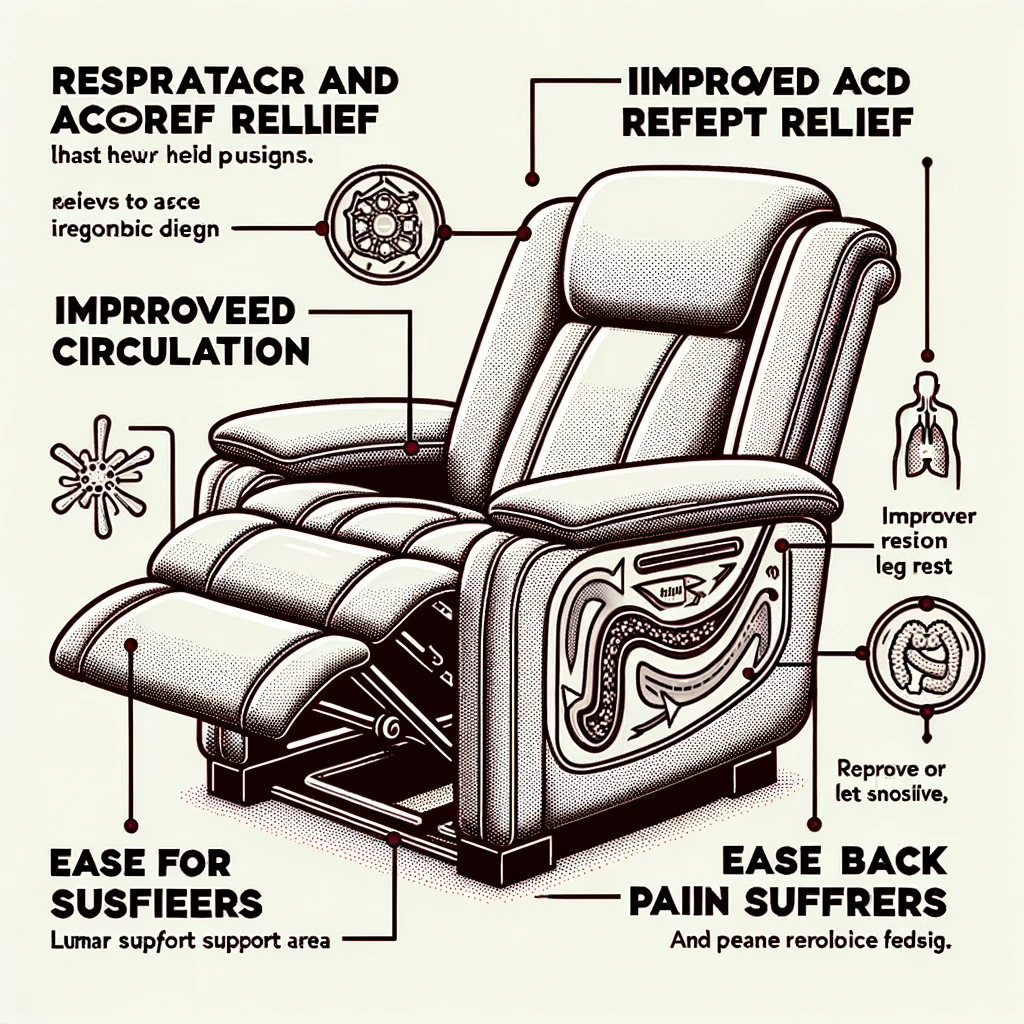
2: Comfort and Coziness in a Recliner
The “Hug” Feeling
Many people describe sleeping in a recliner as being enveloped in a gentle hug. The contoured design provides a snug fit that can instil a sense of security and warmth, often leading to a night of deeper, more restful sleep.
Convenience of Adjustability
Unlike traditional beds, recliners offer the luxury of adjustability. Whether one needs to slightly elevate their legs, change the backrest angle, or achieve a near-horizontal position, recliners can be tailored to individual comfort needs.
3: Space-saving & Multipurpose Nature of Recliners
Ideal for Limited Spaces
In urban settings or shared living conditions, space is often at a premium. Recliners, being more compact than traditional bed setups, can be a practical solution for those looking to maximize their living space.
Dual Functionality
Recliners are the epitome of versatility. During the day, they serve as a comfortable seating option for reading, watching TV, or simply relaxing. Come night, with a few adjustments, they transform into a cozy sleep sanctuary.
Disadvantages of Sleeping on Recliner
Breathing Issues
Even though an elevated position can benefit some people with specific respiratory conditions, it might not be ideal for everyone. The angle of the recliner might cause constriction in the respiratory tract for some individuals, leading to laboured breathing or exacerbation of existing respiratory conditions.
Limbs Falling Asleep
The design of some recliners might cause pressure on certain parts of the body, particularly the arms or legs. Over time, this can lead to reduced blood flow, causing the sensation of “pins and needles” or limbs “falling asleep.”
Poor Balance
If not adjusted properly, there’s a risk of the recliner tipping or causing an individual to slide down, especially in models without adequate foot support. This can be particularly concerning for the elderly or those with mobility challenges.
Risk of Developing Poor Posture
Continuous use of a recliner for sleep might not provide the spine with the uniform support it requires. Over time, this can lead to misalignment, causing or exacerbating back and neck pain.
Wear and Tear Due to Constant Adjustments
Regular use of the reclining mechanism, especially in motorized models, can lead to wear and tear. Over time, this might result in malfunctions, requiring repairs or replacements. Additionally, the upholstery might wear out faster due to the constant friction and movement. While recliners offer a unique sleeping.
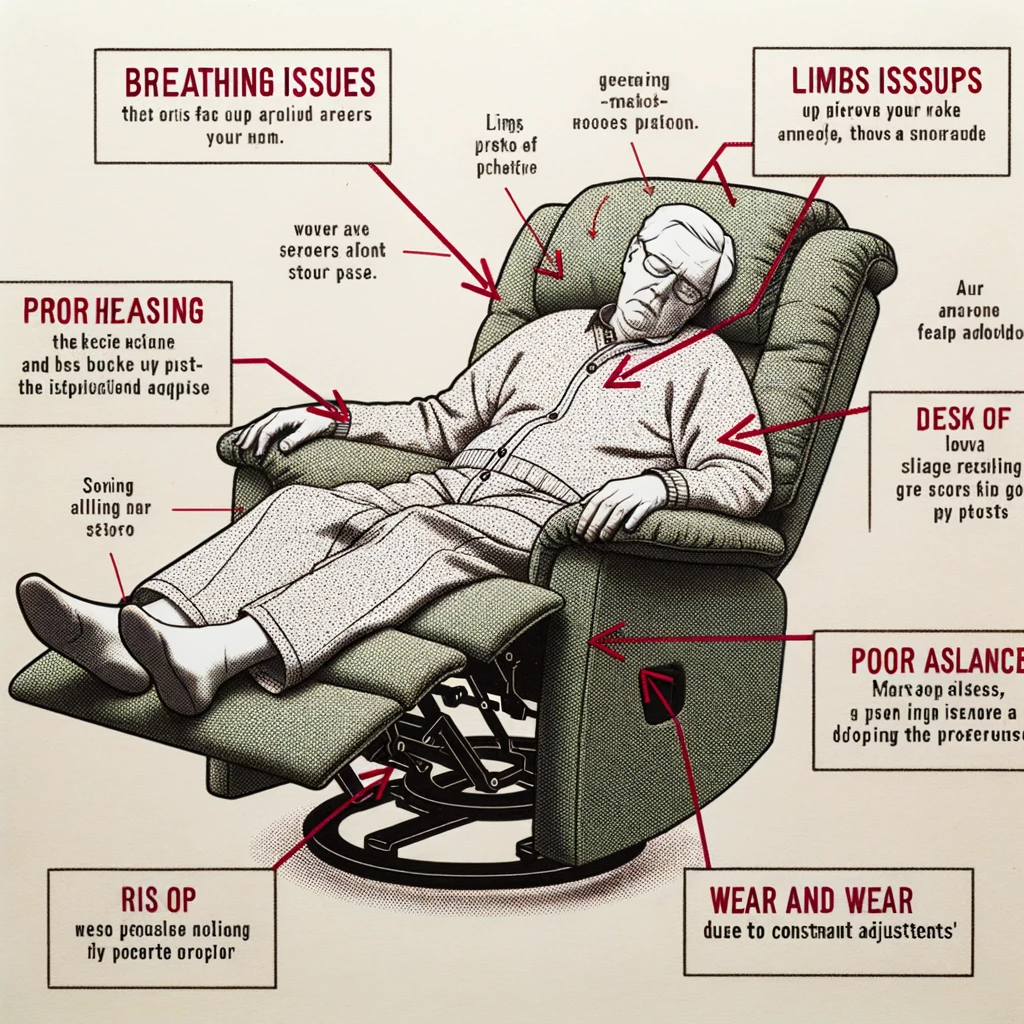
The Case for Bed
1. Ergonomics and Spinal Health
Full-body Support
Beds, with their flat and expansive surface, are designed to offer uniform support across the body. This even distribution of weight can reduce pressure points and minimize the risk of muscle strain or discomfort.
Mattress Quality and Alignment
A good-quality mattress can make a world of difference in sleep quality. It ensures that the spine remains in a neutral position, reducing the risk of back pain. Modern mattresses come in various materials and firmness levels, catering to individual needs.
Knee, Back, and Hip Support
Beds, especially when paired with the right mattress and pillows, can offer targeted support to areas like the knees, back, and hips. This can be particularly beneficial for individuals with joint pain or those recovering from injuries.
Promotion of Good Posture
A flat and supportive bed surface encourages a natural spinal alignment. Over time, this can promote better posture, even during waking hours, reducing the risk of musculoskeletal issues.
2. Space and Flexibility
Unlike more restrictive sleep surfaces, beds offer ample space. This allows individuals to change positions freely throughout the night, catering to their comfort.
3. Minimized Interruptions
The spacious nature of beds, combined with the right mattress, can significantly reduce disturbances during sleep. Whether it’s tossing and turning or the need to stretch out, a bed accommodates these needs, leading to more profound, uninterrupted rest.
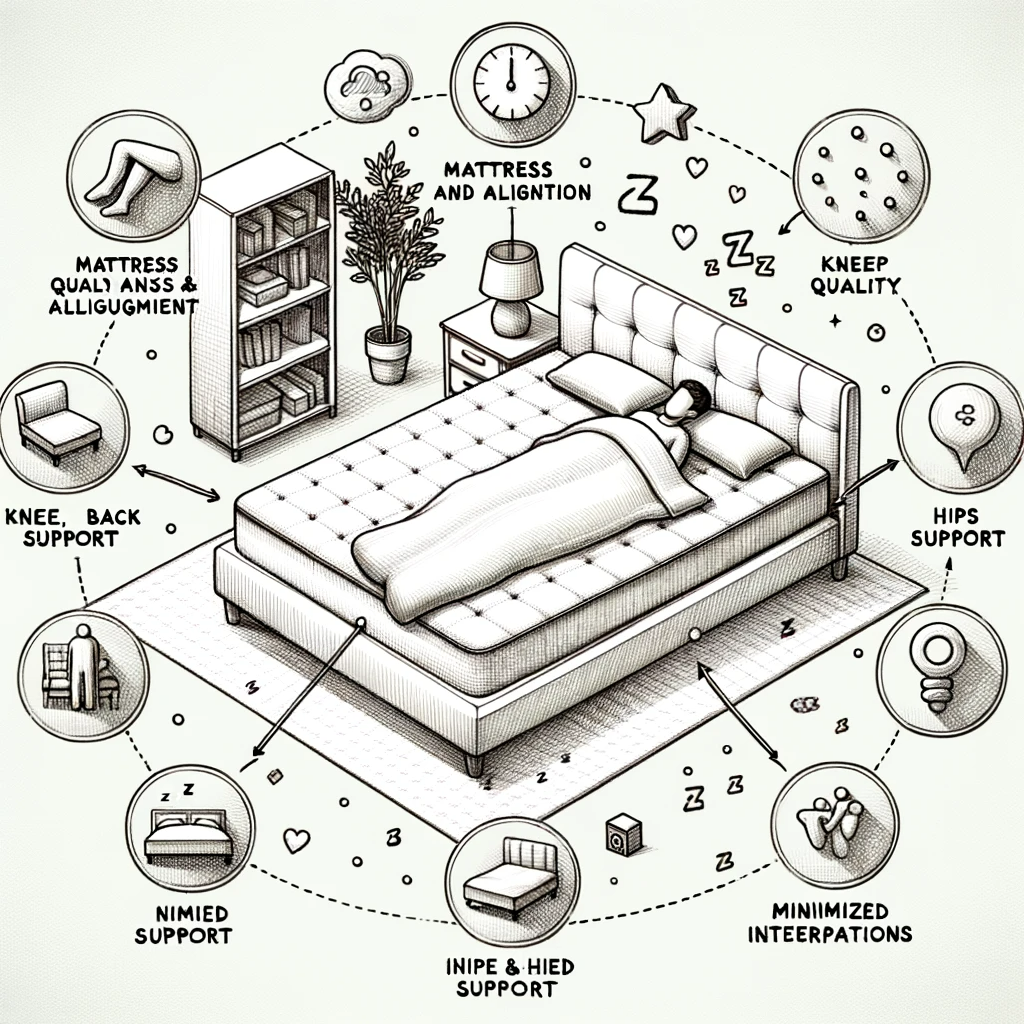
Disadvantages
Health Issues Due to Lack of Elevation:
A flat sleeping position might not be ideal for everyone, especially those with specific medical conditions. For instance, individuals with chronic acid reflux or GERD might experience more frequent or severe symptoms when lying flat on a bed.
Similarly, those with certain respiratory issues might find it more challenging to breathe in a horizontal position.
Bedbugs and Allergens
Beds, especially when not properly maintained, can become a breeding ground for pests like bedbugs. These tiny insects feed on human blood and can cause itchy, red welts. Additionally, mattresses and bedding can harbor allergens like dust mites, mould, and pet dander, which can trigger allergic reactions or exacerbate asthma symptoms.
Risk of Pressure Sores
When one remains in a single position for extended periods, there’s a risk of developing pressure sores, also known as bedsores. These are painful ulcers that form when there’s prolonged pressure on one area of the body, restricting blood flow to the skin. While this is more common in individuals with limited mobility, it’s a potential concern for anyone spending extended hours in bed.
Better Option: For Specific Health Conditions
| Health condition | Sleeping on Bed | Sleeping on Recliner |
|---|---|---|
| Back Pain | Suitable | More suitable |
| Acid Reflux (GERD) | Less Suitable | Suitable |
| Sleep Apnea | Less Suitable | Suitable |
| Post-surgery Recovery | Depends on Surgery | Suitable |
| Swelling of the Legs | Less Suitable | Suitable |
| Pregnancy | Suitable | Less Suitable |
Recommendations
For those grappling with the “Bed versus Recliner” dilemma, here are some recommendations:
1: Consult with a Healthcare Professional: If you have specific health conditions or concerns, seek advice from a healthcare professional or sleep specialist to determine the best sleeping option for your needs.
2: Consider Hybrid Solutions: Adjustable beds that offer the best of both worlds are increasingly available. These can provide the flexibility to switch between reclining and flat sleeping positions.
3: Invest in Quality: Regardless of your choice, invest in quality mattresses and seating that provide the necessary support and comfort. Regular maintenance is also key to ensuring the longevity and hygiene of your sleep surface.
4: Listen to Your Body: Ultimately, your body will guide you to the most comfortable and supportive sleeping option. Pay attention to how you feel when you wake up and make adjustments accordingly.
Final thought:
Ultimately, the choice between a bed and a recliner for sleeping is a highly individual one. Health conditions, personal comfort preferences, available space, and lifestyle all play a significant role in this decision. While beds have stood the test of time and offer a time-honoured sleeping experience, recliners cater to specific needs and can provide unique benefits. It’s crucial to weigh the pros and cons carefully before making a choice that prioritizes health, comfort, and overall well-being.
I recommend sleeping in bed but if you have specific health issues then choose a recliner for sleeping.
What are the potential health benefits of sleeping in a recliner?
Sleeping in a recliner can be beneficial for reducing acid reflux and snoring by keeping the head elevated. It might also offer relief for people with back pain or swelling by allowing adjustment to find a comfortable position.
Is it bad to sleep in a recliner every night instead of a bed?
Consistently sleeping in a recliner might not be the best choice for everyone as it might lead to potential health issues such as blood clots or muscle stiffness. It could be beneficial for people dealing with specific medical conditions like acid reflux or sleep apnea temporarily.
Does sleeping in a recliner contribute to wrinkles or “sleep lines”?
Since the body’s position in a recliner is somewhat tilted, it might reduce the likelihood of sleep lines or wrinkles caused by pressing the face against a pillow.
Can sleeping in a recliner help with snoring?
Yes, it can. Sleeping in a recliner may reduce snoring for some people by elevating the upper body, which can open up airways. However, it’s not a guaranteed solution, and you should address the underlying causes of snoring.
Is it safe for pregnant women to sleep in a recliner instead of a bed?
Pregnant women should avoid sleeping in a recliner for extended periods due to the risk of reduced circulation and potential discomfort. Beds are a safer and more comfortable choice during pregnancy.
Can sleeping in a recliner lead to sleep disorders or disturbances?
Prolonged use of a recliner for sleep can potentially lead to sleep disturbances and disorders, such as insomnia or sleep apnea, due to the unnatural sleeping position it offers. Beds are designed for optimal sleep quality.
